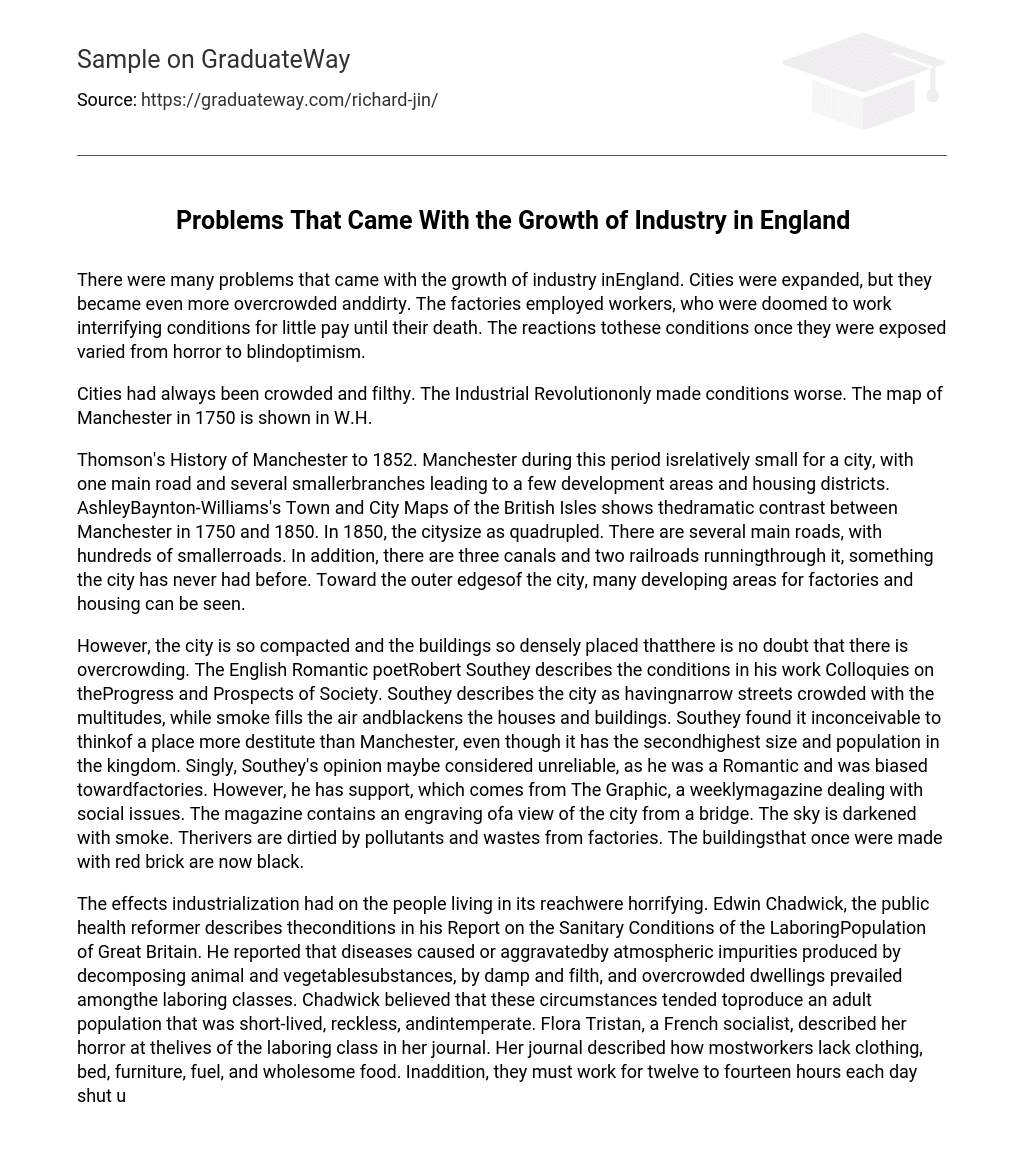There were many problems that came with the growth of industry inEngland. Cities were expanded, but they became even more overcrowded anddirty. The factories employed workers, who were doomed to work interrifying conditions for little pay until their death. The reactions tothese conditions once they were exposed varied from horror to blindoptimism.
Cities had always been crowded and filthy. The Industrial Revolutiononly made conditions worse. The map of Manchester in 1750 is shown in W.H.
Thomson’s History of Manchester to 1852. Manchester during this period isrelatively small for a city, with one main road and several smallerbranches leading to a few development areas and housing districts. AshleyBaynton-Williams’s Town and City Maps of the British Isles shows thedramatic contrast between Manchester in 1750 and 1850. In 1850, the citysize as quadrupled. There are several main roads, with hundreds of smallerroads. In addition, there are three canals and two railroads runningthrough it, something the city has never had before. Toward the outer edgesof the city, many developing areas for factories and housing can be seen.
However, the city is so compacted and the buildings so densely placed thatthere is no doubt that there is overcrowding. The English Romantic poetRobert Southey describes the conditions in his work Colloquies on theProgress and Prospects of Society. Southey describes the city as havingnarrow streets crowded with the multitudes, while smoke fills the air andblackens the houses and buildings. Southey found it inconceivable to thinkof a place more destitute than Manchester, even though it has the secondhighest size and population in the kingdom. Singly, Southey’s opinion maybe considered unreliable, as he was a Romantic and was biased towardfactories. However, he has support, which comes from The Graphic, a weeklymagazine dealing with social issues. The magazine contains an engraving ofa view of the city from a bridge. The sky is darkened with smoke. Therivers are dirtied by pollutants and wastes from factories. The buildingsthat once were made with red brick are now black.
The effects industrialization had on the people living in its reachwere horrifying. Edwin Chadwick, the public health reformer describes theconditions in his Report on the Sanitary Conditions of the LaboringPopulation of Great Britain. He reported that diseases caused or aggravatedby atmospheric impurities produced by decomposing animal and vegetablesubstances, by damp and filth, and overcrowded dwellings prevailed amongthe laboring classes. Chadwick believed that these circumstances tended toproduce an adult population that was short-lived, reckless, andintemperate. Flora Tristan, a French socialist, described her horror at thelives of the laboring class in her journal. Her journal described how mostworkers lack clothing, bed, furniture, fuel, and wholesome food. Inaddition, they must work for twelve to fourteen hours each day shut up inlow-ceilinged rooms where the air is saturated with the fibers of cotton,wool or flax, or particles of copper, lead or iron. All of the laborersbecame sickly and emaciated from these conditions, their bodies thing andfrail, their limbs feeble, and their complexions pale. The smoke and filthof cities not only affected the laboring class. The Lancet, a Britishmedical journal, recorded the average age at death in both rural andindustrial districts in 1843. In rural districts, the gentry lived twice aslong as the laborer and about 50% longer than the farmer. In industrialdistricts, the life span of all the people is shortened by twenty years.
Once again, the laborer lives only half as long as the gentry, making theaverage age at death of a laborer eighteen.
Fortunately, conditions slowly improved for the workers over time,and with it, the opinions of the people of industrialization. The 1830swere perhaps the worst years of all. Thomas Macaulay wrote in his essay thepoverty of the people. He has an angry, sarcastic tone throughout hispiece. Frances Anne Kemble wrote an account of his inaugural journey toManchester. He recorded that there was a riot, where a vast crowd ofManchester artisans and mechanics showed their discontent with thegovernment and the Corn Laws by greeting his carriage with groans andhisses. Above the crowd of rioters sat a starved-looking weaver. Thisweaver was the representative man, the man who symbolized the condition andunhappiness that the whole town was experiencing. Alexis de Tocquevilledescribed what he saw in his Journeys to England and Ireland. He saw peoplesimply bustling around the streets without stopping. Nobody was taking aleisurely walk in the streets or going to seek simple enjoyment in thesurrounding country. He is horrified and describes the city as the placewhere humanity reaches it most brutish state. By the 1850s, many reformshad been made. Working conditions improved, and the opinions of peopletoward factories vastly improved. Wheelan and Co., in a preface to abusiness directory, praised the city of Manchester. Wheelan and Co. Describe Manchester as being remarkable and attractive, terming it as the”Workshop of the World”. They continue to tell of the effects of thereform, one of them being the elevation as a seat of commerce andmanufacture. William Alexander Abram, wrote in a journal article thecomparison of industry conditions during the 1830s as opposed to the 1860s.
He mentions the Hours of Labor in Factories Act. This reform reduced theexcessive hours of labor to just ten hours. Wages had also increased. Healso describes the lavish provision of public parks, baths, and freelibraries that promote health, happiness and culture of the industrialorders. Much less are the murmurs of discontent.
The Industrial revolution started of with terrible work conditionsand long hours. Many reforms were made, partly on the outcries of reportersand humanists. Many of the working conditions taken granted today werereforms made during this period of time.





